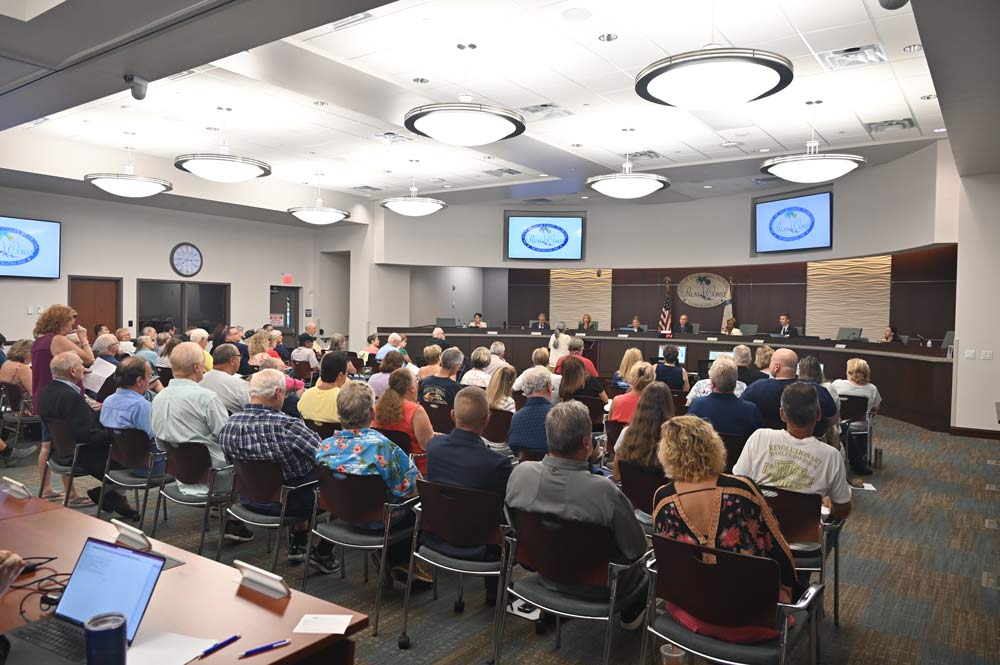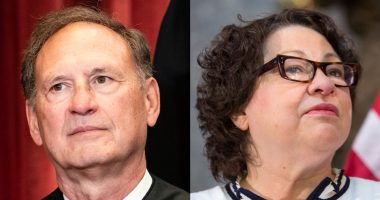
In another unseemly, disconcerting meeting that included coarse language and flaring tempers from the dais and rowdy and name-calling behavior from a floor thronged with residents, the Palm Coast City Council today substantially lowered the property tax rate in one vote and with another approved a new fee or tax–a very modest one for now–on power bills.
The fee was approved on first reading, and would have to be ratified again in two weeks. Based on the plan approved today, the council would leave it to voters in a future non-binding ballot initiative to determine what percentage of the new utility franchise fee they’d be willing to tax themselves–between 0.5 percent and 6 percent–so the city can use the revenue to maintain or improve city streets in increasing need of attention.
The ballot initiative is not a certainty: the administration will explore that legality in the next two weeks, and resubmit the proposal to the council for final approval on second reading. If the city cannot go that route, the franchise fee would be scrapped. If the council approves the new fee later this month, it will go in effect at the 0.5 percent rate this fall. A different rate would only go in effect if voters approve it in the November 2024 election.
Both votes split the council 3-2, with Mayor David Alfin and council members Nick Klufas and Theresa Pontieri in the majority, and Ed Danko and Cathy Heighter in dissent. Both votes caused a ruckus.
Danko was chiefly responsible for the tawdriness of the meeting as he incited the crowd and pandered to it, especially when Alfin, in a tactical blunder, passed the gavel to Danko–the vice mayor–so Alfin could make a motion to approve the new tax rate. That enabled Danko to chair that portion of the meeting so unchecked that he jeered the mayor and gaveled the city attorney to shut her up as she attempted to restore the very decorum he had fractured.
“I normally would be in favor of a complete millage rollback that would mean zero increases on your property tax,” Danko said. “However, in this case, it’s nothing but a cheap political trick, and it’s basically we’re going to give you a break here, but then we’re going to shove it up your ass over here, and take the money back from you.” He went on along those lines before turning to the mayor: “I gotta tell you, Mr. Mayor. I am ashamed of you today, this is the cheapest trick, oldest political trick in the book, and the fact that you would try to pull this off, I have no doubt people will remember this come election time.”
“You’re here grandstanding,” Klufas, who has rarely lost his cool on the dais, told Danko, his voice rising and his fist pounding the dais, before Danko interrupted him by accusing him of not doing his job and the attorney attempted to intervene, invoking “rules of decorum.”
“I think you’ve taken some liberties, campaigned and pandered quite a bit,” Alfin told Danko when the mayor reclaimed the gavel.
Read Related Also: Husband who accused top state lawmaker of pressuring estranged wife into group sex for ‘political favor’ resolves lawsuit
The clamor of the meeting drowned out its somewhat historic import: while Palm Coast has adopted the rolled-back rate in the past, it has never done so by cutting its way back to rollback and eliminating revenue–$2.8 million would be cut from what the current rate would have brought in net year. That’s 60 percent of the projected increase in revenue the administration had proposed.
In the aftermath of the housing crash in 2007, the council went to rollback in some years, but it had to increase the tax rate to get there, compensating for property values that had plummeted. At the time, raising the tax rate to rollback ensured that the city’s revenue stayed flat.
The second historic change today was the city’s adoption of a new fee, or tax–the utility franchise fee, in a 30-year agreement with Florida Power and Light. While the contract gives the city a potentially hefty source of new revenue, that would happen only if the fee is set at 6 percent, the maximum allowed by law (and the level at which cities like Bunnell, Flagler Beach and Ormond Beach set their fee.) The council considered such a fee at least twice in the last 11 years, only to face fierce resistance from the public and reverse course.
The utility franchise fee agreement passed today, but mostly as a place-holder. The fee itself was set at 0.5 percent, the lowest level at which it may be set. It’ll cost a household using 1,000 kwh a month about $2 a month, or $24 a year. If the city had set the fee at 6 percent, it would have cost closer to $8 or $10 a month.
Pontieri made the case for the franchise fee as a way of diversifying the city’s tax base. She said, with agreement from Klufas, that the city should never again be in the position it was in the aftermath of the housing crash, when it had to raise the property tax as steeply as it did to ensure that services continued. What neither Pontieri nor Klufas noted was that those increases were not, in fact, tax increases on residents, but rate increases to keep revenue level. The effect on property owners, homesteaded property owners especially, was neutral.
Nevertheless, the franchise fee, while more regressive than the property tax, would apply to all properties–homesteaded homes, business, schools, churches, non-profit organizations–as the property tax does not. It would as Pontieri suggests, be a hedge against plummeting property taxes, should a crash happen as it did in 2006-7. That’s assuming the franchise fee is generating substantial revenue.
[This is a developing story. More soon.]










